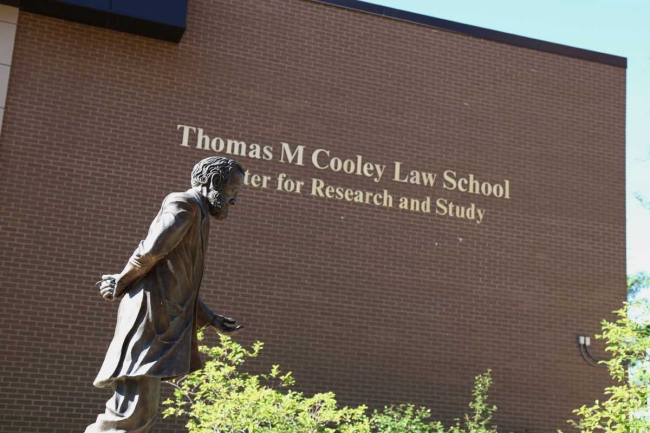You have /5 articles left.
Sign up for a free account or log in.

WMU Cooley Lansing campus
Courtesy of Thomas M. Cooley Law School
The Western Michigan University Board of Trustees voted unanimously on Thursday to end the university’s affiliation with Thomas M. Cooley Law School.
WMU signed a formal affiliation agreement with then independent Thomas M. Cooley Law School in 2013. Seven years later, anticipated collaborations between the two institutions never materialized, James Bolger, board chair, explained during the board meeting.
“As our relationship matured and evolved, the priorities of each school have shifted, and the expected synergy of our 2013 vision were not fully realized,” Bolger said during the meeting. “Our board has examined the future of these agreements with the desire that moving forward with each institution would allow that institution to improve their strategic position to navigate their own respective futures.”
Bolger did not elaborate on what the expected synergy entailed, but a 2013 press release announcing the affiliation agreement mentioned the possibility of a 3+3 program allowing students to complete their bachelor's and law degrees in six years, interdisciplinary teaching and research opportunities for faculty, and additional joint course offerings in areas that focus on the legal environment for business, education, health care or intellectual property.
The original goal of the agreement was to “improve the quality of the educational experience for students at both institutions,” and to “serve to enhance the reputation and standing of both institutions in the academic community,” according to the board proposal. “Several years after implementation those hopes have not been realized.”
The law school did offer some first- and second-year classes at WMU's Kalamazoo campus, but the classes failed to draw more than 20 students and were subsequently suspended, Law.com reported.
The proposal also cited the COVID-19 pandemic and noted that WMU was choosing to focus more on its own core mission. The affiliation with Cooley was a "distraction" from that mission, according to the proposal.
In keeping with the 2013 agreement, it will take three years to fully dissolve the affiliation. In 2023, the law school will stop using the WMU name. But beyond a name change, the dissolution will have little impact on either institution. The university and the law school never shared funds or financial support, maintained separate leadership and governing boards, and operated independently.
The board proposal to end the affiliation agreement followed meetings with Cooley’s board, which took place over the summer, Bolger said. The proposal prompted little discussion at Thursday’s board meeting.
“I appreciate WMU's need to focus on its core mission during this period. WMU-Cooley is also refining its program in the face of COVID-19, and these efforts will expand upon our recent innovations,” James McGrath, president of Cooley, said in a press release. “Since my arrival last year, we have embraced modern teaching techniques, increased our admissions profile, decreased tuition by 21 percent and consolidated our footprint into two campuses. The end of the affiliation will not affect our ability to continue to deliver a quality student experience as we have over the course of our 48-year history.”
Cooley referred requests for comment to WMU. WMU declined to comment beyond the press release.
Once a large law school with four campuses, Cooley downsized in the past decade. Enrollment fell from more than 3,900 students in 2010-11 to 1,156 in 2019-20. The law school announced in August that it would close its campus in Grand Rapids, Mich., in August 2021 and move all classes and operations to its campus in Lansing, the state capital. It also closed its campus in Auburn Hills, Mich., last year and reduced the footprint of the Lansing campus. Cooley still maintains one other campus in Tampa Bay, Fla.
Cooley announced last year that it would reduce its tuition by 21 percent, from $1,750 per credit hour to $1,375, in part to “strengthen its affiliation with Western Michigan University,” according to a statement from McGrath at the time.
McGrath said the lower tuition price will allow the law school to continue to serve a diverse population of students.
“We realize that a significant part of providing access to legal education is cost. To put it simply, we became too expensive," McGrath said in an August 2019 statement.
Nearly 44 percent of students enrolled at Cooley in 2019 were members of minority groups, according to the law school's website. More than half of the students were women, and more than 80 percent of students were enrolled part-time.
Cooley has clashed with its accreditor, the American Bar Association, in years past. In 2018, the ABA published a letter on its website accusing more than a dozen law schools, Cooley among them, of violating an accreditation standard by admitting students that were unlikely to succeed and pass the bar exam. Cooley claimed the ABA had harmed the law school's reputation and finances and, in response, asked a federal judge to force the ABA to pull the letter from its website and withdraw copies sent to the U.S. secretary of education, the Higher Learning Commission and state regulators in Michigan and in Florida. The judge dismissed Cooley's request.
Ryan Quandt, a junior at WMU, said he won't miss Cooley even though he's seriously considering attending law school. He said he ruled out Cooley in his first year of college after reading about Cooley's low student success rate.
"Generally, people coming out of that school don't get great jobs, and when you're putting a lot of money into a law degree, something you have to think about heavily is 'Am I going to get the cost back from the investment that I put into the degree?'" Quandt said. "Cooley doesn't necessarily have a great reputation, not just among WMU students, but among people going into the law profession, especially in Michigan. It's not in people's top 10 choices."




